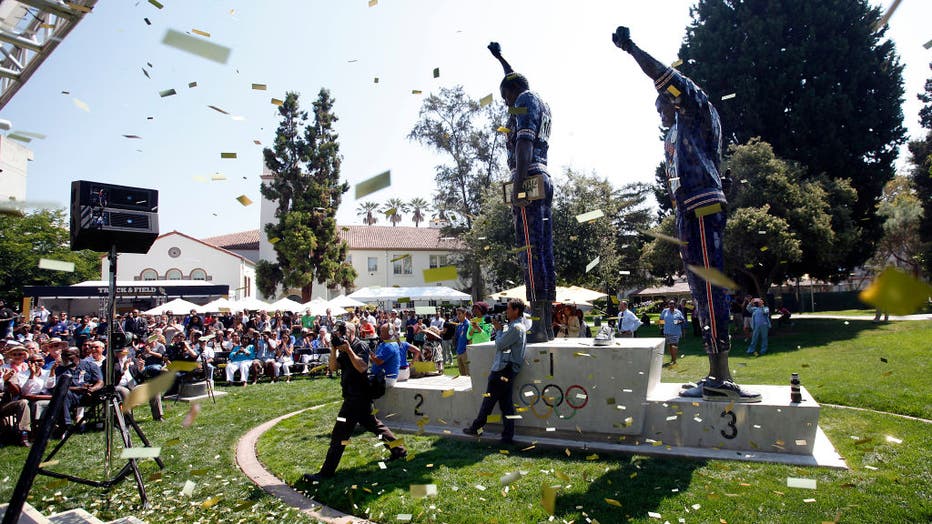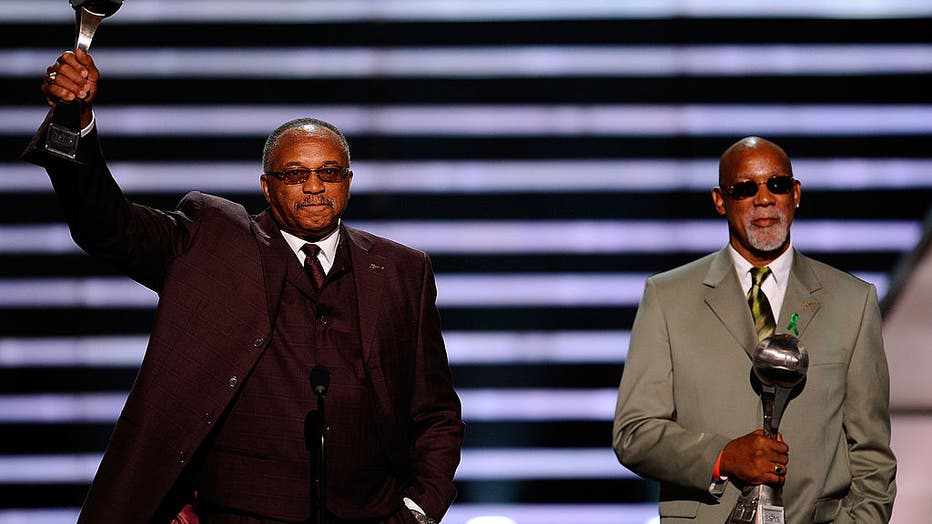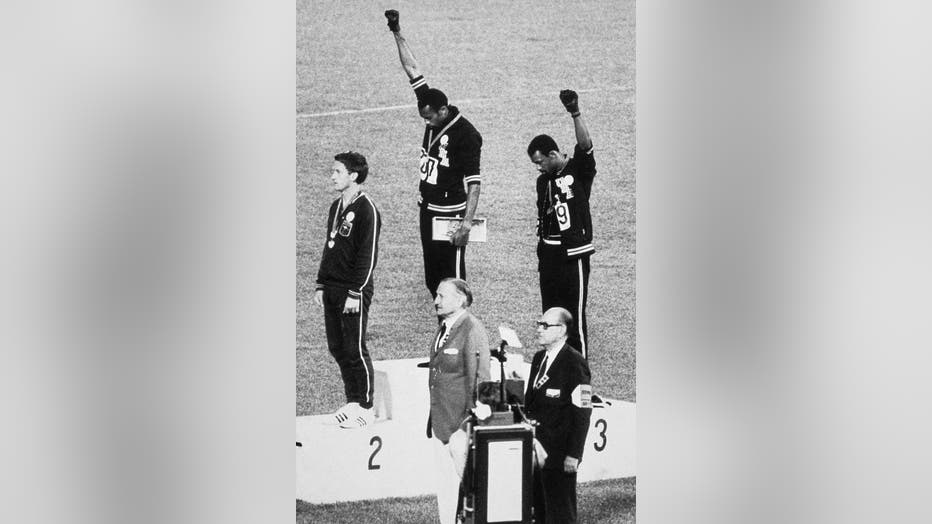Cal Athletics honors civil rights Olympic activists Tommie Smith, John Carlos, Harry Edwards

Some Cal softball players (far right) take a knee against the University of Lousiana-Lafayette Ragin Cajuns on Feb. 11. Screen grab ESPN.
BERKELEY, Calif. - When a half-dozen Cal Bears softball players decided to take a knee during the national anthem before a game in Louisiana earlier this month, they knew they were modeling what former 49ers quarterback Colin Kaepernick did when he took a stance against police brutality nearly a decade ago.
"I’ve been kneeling during the national anthem with a handful of my teammates since last year in solidarity with people who’ve lost their lives to police brutality," Cal softball player Elon Butler told KTVU on Thursday. "It’s not really a trend or anything like that, it’s truly near and dear to my heart."
What they might not have known is that Kaepernick looked up to his own role models.
On Friday, Cal Athletics is hosting a Black History Month panel discussion to honor those legendary heroes.
Former Olympic medalists Tommie Smith and John Carlos, and renowned sociologist Harry Edwards will be the featured panelists for the department’s monthly Playbook series. The event will highlight their contributions to sports and society and the work they’ve done to advocate for social justice and racial equality.
"I’m not sure this generation of student-athletes knows how important their story is," Butler said. "I’m from the Bay Area, but I never truly knew the details of what they did at the 1968 Olympics until recently. I actually had to go look it up to get a full understanding."
Cal softball head coach Chelsea Spencer said it's important young players know about what Smith, Carlos and Edwards did – and hear from them firsthand since they have the chance.
"We can’t just assume that young people have been taught this history," Spencer said. " High schools don’t really teach about stuff like this, so we have to continue to talk about these types of movements and have these conversations."
And as for the players taking a knee?
"I wanted our players to know that we fight together and that I got their back no matter what," Spencer said, adding that she knelt during the anthem too. "These are my people. They go to war for me every day. I respect them for being courageous and standing up for what they believe in."
Smith and Carlos are famously known for silently protesting what they believed in at the Olympic Games in Mexico City 56 years ago.
During the medal ceremony, the San Jose State student-athletes transformed the international stage into a platform for social justice.
After winning gold and bronze, respectively, in the 200-meter race, they walked to the podium with only black socks on their feet, bowed their heads and raised gloved fists in the air as the national anthem played to protest racial injustices in the United States.
What they did is considered one of the most famous moments of political speech in the history of the Olympics and would become one of the most iconic images of the 20th century.
A statue of them currently has a prominent spot on the SJSU lawn.
"It’s an honor to introduce them, and in some cases re-introduce them, in the region where they began their activism and gained valuable life experiences as student- athletes," Cal’s Associate Athletics Director for Diversity, Equity, Inclusion, Belonging & Justice Ty-Ron Douglas said. "To come back to the place where that spirit was nurtured and birthed, and to be loved on by younger generations in this season of their lives is special."

24-foot-tall statutes of Spartan star runners Tommie Smith and John Carlos, who were both in attendance at San Jose State University. (Photo by Karl Mondon/MediaNews Group/The Mercury News via Getty Images)
In a country that hasn’t always lived up to its ideals of freedom and equality, the Bay Area has been a stomping ground for social justice.
The region has a rich history of events and figures that have helped pave the way for human and civil rights.
Athletes with local ties have been using their platform to inspire change for decades.
That includes baseball legend Willie Mays quietly persisting to win a housing battle after he was denied from buying a home in San Francisco because he was Black to 49ers quarterback Colin Kaepernick being black-balled out of the league for kneeling during the national anthem in protest nearly 50 years later.
"You can’t tell the story of activism in this country and the world without talking about the Bay," Douglas said. "This place gives birth to leaders and activists."
As a San Jose State sociology professor, a year before the 1968 Olympic Games, Edwards organized the Olympic Project for Human Rights with many prominent Black athletes, including Smith and Carlos. Edwards was also a consultant to the 49ers – the very team Kaepernick used to play for.
The organization’s goal was to advocate for Black athletes and focus on the treatment of Black people in the United States.
While some members organized a boycott, Smith and Carlos saw the upcoming Olympics as an opportunity to address their concerns about rampant racial discrimination and human rights that were being violated throughout the country.
Older generations and people that lived through the civil rights era will remember the significance of that moment.
They understand how transcendent the silent protest was and how it spoke to the harsh realities of Black people living in the United States.
However, most college students today were born in the 21st century.
The iconic image of Smith and Carlos may not resonate with future generations without proper context.
"Honestly, I learned about the 1968 Olympics Black Power salute when I got to Cal two years ago," said 20-year-old Cal soccer player Courtney Boone. "It’s not something that’s taught in every school. If we wanted to learn things like this, we’d have to go out on our own and get this information."
As time goes on, it’s important to pass on memories that predate our current time to help us learn from the past.
Understanding history gives society a shared memory that helps develop perspective, appreciation, empathy and critical thinking.
It's especially important to inspire future generations of student athletes.

(L to R) Eli Harold, Colin Kaepernick and Eric Reid of the San Francisco 49ers kneel during the anthem prior to the game against the Dallas Cowboys at Levi's Stadium in Santa Clara, Calif. Oct. 2, 2016 Photo: Thearon W. Henderson/Getty
After their protest, Smith and Carlos were expelled from the games and suspended from the United States national team.
They faced many challenges as a result of their actions when they returned home. In the following years, they would be harassed, discriminated against, criticized by the media, and received death threats.
Those long-ago challenges resonate with today's youth.
"My philosophy professor shared a quote by Martin Luther King that basically says ‘One who breaks an unjust law must do so openly, lovingly, and with a willingness to accept the penalty, " Boone said. "I think that kind of shows their courage to confront the law and want to make the law better."
Cal softball players tapped into that ethos a couple of weeks ago.
The student-athletes who took a knee during the national anthem in Louisiana were booed and heckled by a handful of fans in the stands.
They could be heard verbally harassing and yelling, "Stand up, California'' from the ESPN Plus telecast.
Teammates who were not kneeling surrounded those on one knee and began to hold hands to block out the distraction and noise.
"Those who chose to kneel and stand behind their teammates in support did so in the spirit of Edwards, Smith, and Carlos by using their platform to raise consciousness and being open to continuing the process of learning and educating others," Douglas said. "In many respects, it was a full circle moment."

John Carlos (R) and Tommie Smith accept the Arthur Ashe Award for Courage as they were given the award for their black-gloved fist salute at the 1968 Mexico City Olympics at the 2008 ESPY Awards held at NOKIA Theatre L.A. (Photo by Michael Caulfield/

During the award presentation for the Men’s 200-meter event final at the 1968 Summer Olympics, American athletes, gold medalist Tommie Smith (center) and bronze medalist John Carlos (right), each raise a clenched fist and bow their heads during the U

